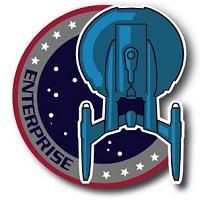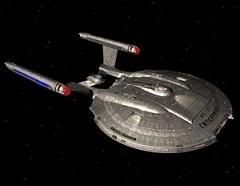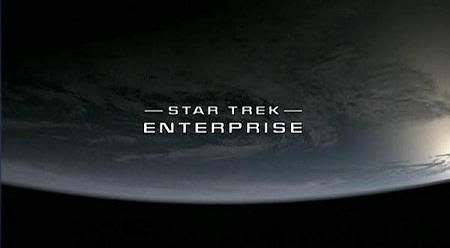Star Trek: Enterprise series review....
It was about three months ago when I posted a review of the Star Trek: Voyager series. I thought that would be the last Trek series that I would posting a review on. I guess I spoke too soon.
This morning I finally completed watching all four seasons of Star Trek: Enterprise (ST:ENT). Like most other fans of the franchise, I too have mixed feelings about it. As an introduction to this review, let me quote an excerpt from my teaser write-up of sorts from last December:
...it's pretty common knowledge that Star Trek: Enterprise has turned out to be the most controversial Trek series ever since the franchise was reborn in 1987. Unlike the earlier three shows which lasted seven seasons each, Enterprise only lasted four due to dismal ratings. Its relatively poor viewership and acceptance by the Trek community were due in part to allegations that the series violated Star Trek canon and continuity over the course of its four year run. As a result, a lot of hardcore trekkies have refused to accept the events depicted in the series as canon, despite the insistence of producers/writers Rick Berman and Brannon Braga.
Now that I've finally seen the series in its entirety, what do I think of it? Actually, I think it's pretty good, but admittedly, it does fall somewhat flat in a number of areas.  To it's credit, I think ST:ENT features what is perhaps the franchise's best acting in a series, ever. The cast in general this time around is much more capable of evoking the feelings and emotions of the particular roles they're playing, which is a welcome relief from the oftentimes wooden acting from the other earlier series. I would surmise that this is in part to the setting of the series itself. ST:ENT is set in the year 2151, about midway between the events in Star Trek: First Contact and Star Trek: The Original Series, ten years before the birth of the Federation. As such, there is much of the uncertainty, the fear, the paranoia and xenophobia of contemporary society in the series, a far cry from the utopic paradise depicted from the original Star Trek onwards. Yet, there are still those characteristic ideals of humanity present in any Trek series: hopefullness, loyalty, commitment to duty, and the drive to explore.
To it's credit, I think ST:ENT features what is perhaps the franchise's best acting in a series, ever. The cast in general this time around is much more capable of evoking the feelings and emotions of the particular roles they're playing, which is a welcome relief from the oftentimes wooden acting from the other earlier series. I would surmise that this is in part to the setting of the series itself. ST:ENT is set in the year 2151, about midway between the events in Star Trek: First Contact and Star Trek: The Original Series, ten years before the birth of the Federation. As such, there is much of the uncertainty, the fear, the paranoia and xenophobia of contemporary society in the series, a far cry from the utopic paradise depicted from the original Star Trek onwards. Yet, there are still those characteristic ideals of humanity present in any Trek series: hopefullness, loyalty, commitment to duty, and the drive to explore.
Strangely enough, I found myself being able to relate more to the persona of Jonathan Archer (played by Scott Bakula), Captain of the NX-01 Enterprise, than with the other captains in the Star Trek universe. He is not as gung-ho nor does he command by the seat of his pants as Kirk, as stuck-up or as anal as Picard, as torn or as conflicted as Sisko, or as motherly and as Victorian as Janeway. And that's a good thing, as he exemplifies the best and worst qualities of humanity as demonstrated by the several difficult decisions that he had to make during the course of his missions. And this he accomplished, without the existence of the Federation, allies (at least at the start) modern weaponry and defensive systems, and the oft-mentioned prime directive.
Jolene Blalock also passes admirably for the Vulcan T'Pol, with more depth and dimension given to the role that with any other Vulcan in the Trek universe, with the possible exception of Leonard Nimoy's portrayal of Spock. We see in great detail her emotional struggles as she confronts firsthand the initial difficulties of living among humans, Vulcan politics, religion, drug addiction, romantic relationships, and even the loss of a child.
Completing the triumvirate of ST:ENT's frontliners is Conner Trineer as Enterprise's Chief Engineer, Commander Trip Tucker, whose southern drawl and offbeat sarcasm provide a good foil to the duty bound yet moralistic Archer and the logical T'Pol. Too bad he had to...well, just watch it yourself.
With such good acting, why did it fail as a series?
If you ask me, I would attribute it to faulty writing. To be fair, the series had its high points with some great storylines, but it never seemed consistent enough to draw in the viewers, at least for the first two seasons. In an attempt to uplift the dwindling ratings and to improve regular viewership, the third season spanned virtually only one main plotline, the Xindi story arc. While there was some satisfaction to be had in watching that arc resolve itself over the course of an entire season, I found it for the most part dragging, annoying and irritating. And I was watching it on DVD. I can imagine the frustration a viewer would feel if he or she had to wait another week just to see a minor plot development. This is in stark contrast to the Dominion War story arc of Star Trek: Deep Space Nine, which despite being stretched out over a multitude of episodes, had a rapidly progressing plot which built up to a dramatic denouement. The best writing by far was done during the fourth episode, but by that time it was too late. The death knell for Enterprise had already been rung, there would be no fifth season. Enterprise has been severly criticized for allegedly breaking canon and continuity with respect to the other series. After seeing all the episodes, I'm inclined to think that while it may be guilty of some violations, they certainly weren't grave enough to ruin the series entirely. Well, for me at least. Most can be explained through the use of plot devices such as alternate timelines. As for the other discrepancies, its not such a big deal if you realize that all of the other series have had some problems with canon and continuity as well. The mere fact that ST:ENT is set way ahead of the other series only makes the discrepancies more readily apparent. Is it a big deal? As far as the story is concerned, not very. But as far as hardcore fan acceptance is concerned, they are nothing else but fatal. More on this later.
Enterprise has been severly criticized for allegedly breaking canon and continuity with respect to the other series. After seeing all the episodes, I'm inclined to think that while it may be guilty of some violations, they certainly weren't grave enough to ruin the series entirely. Well, for me at least. Most can be explained through the use of plot devices such as alternate timelines. As for the other discrepancies, its not such a big deal if you realize that all of the other series have had some problems with canon and continuity as well. The mere fact that ST:ENT is set way ahead of the other series only makes the discrepancies more readily apparent. Is it a big deal? As far as the story is concerned, not very. But as far as hardcore fan acceptance is concerned, they are nothing else but fatal. More on this later.
In a way I can't help but feel disappointed over the short life of ST:ENT. It clearly passed on even before reaching its peak, just when it was hitting its stride. The series (and franchise) finale These Are the Voyages... was okay, but it lacked the oomph you would expect from a last episode. It was abrupt, lacked forethought in the details, questionable in accuracy (given the fact that it was set in a holodeck), and hanging. In short, it didn't give that much closure. The final sequence in which the trademark Star Trek intro is narrated by three generations of Enterprise captains sent chills up my spine (as it probably would to any trekkie), but not much else.
All in all, it was a good Trek series, easily a match, perhaps even better in some ways than its forebearers. Had it lasted for a seventh season like the others (except for the original series) I'm sure that it would have reached the lofty goals of its producers in delivering a definitive prequel series faithful for the most part to Trek lore and tradition. Unfortunately, it was not to be, and for all the effort that has been put to it, not to mention the high caliber acting, excellent writing in the latter episodes and the consistent high production values, ST:ENT has been relegated to its undeserved status of being the franchise black sheep ever since it was reborn in 1987.
Star Trek as a franchise has easily become a victim of its own success, with the rise of the internet and message boards giving hardcore fans a means to bring down any Trek show or movie that they didn't agree with. Talk about inmates running the asylum. If you go past the details and quibbles, you'll see ST:ENT the way I see it: a damn good, entertaining show. Cancellation notwithstanding. And for those bashers who hate ST:ENT with such passion, remember, it's just a show. Once you get past that, I'm sure you'll enjoy it as much as I did.
Other Star Trek blog entries:
Trekkie relapse....
Star Trek: Voyager series review....
Star Trek: First Contact
My own Star Trek awards....
The trekkie in me....
Star Trek: Deep Space Nine series review....

Comments
I hear there one of the ST:TOS as well, am looking for it myself. :-)